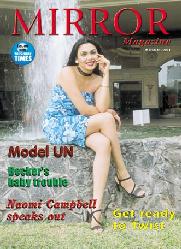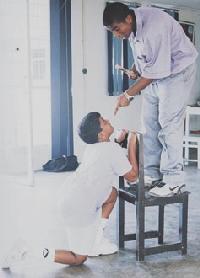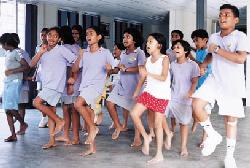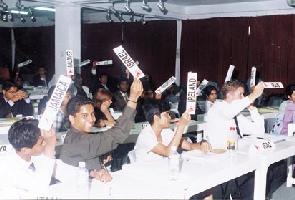
11th March 2001
Front Page|
News/Comment|
Editorial/Opinion| Plus|
Business| Sports|

![]()

Sandhya Prakash







A brand new twist
This is not the Oliver Twist that you are familiar with. This is Oliver 'Twisted'
By Ruhanie Perera
It's the story of the little orphan boy, caught up in a gang of thieves, who stumbles upon happier days when fate takes hold of his life and delivers him into a rosy future that's just waiting for him; yes, it's the story of everyone's favourite scamp Oliver Twist.
 But,
wait a minute - before you jump to any conclusions, this is not the Oliver
Twist you all know and love. It's an adaptation of Dickens' story into
a script for theatre by Guy Williams who gives it a slight 'twist'. Added
to that, the script is peppered with some of the more well-known and loved
tunes from the popular musical 'Oliver', which serve to enhance the production.
Thus it's very much an Oliver 'Twisted' - the name the students of British
School have aptly chosen for their annual production.
But,
wait a minute - before you jump to any conclusions, this is not the Oliver
Twist you all know and love. It's an adaptation of Dickens' story into
a script for theatre by Guy Williams who gives it a slight 'twist'. Added
to that, the script is peppered with some of the more well-known and loved
tunes from the popular musical 'Oliver', which serve to enhance the production.
Thus it's very much an Oliver 'Twisted' - the name the students of British
School have aptly chosen for their annual production.
The script chosen by Vinodh Senadheera, who directs the play, is a unique one. The story is that of the original Oliver Twist, told however, by the now grown up (18-year-old, to be precise) Oliver. Several scenes from the childhood classic have been omitted. Thus the play is made up of the most important scenes in the book, those which in the opinion of Guy Williams, have had a direct impact on the life of young Oliver. The story unfolds in a sort of flashback technique with the grown up Oliver as the only voice from the present. The rest of the cast acts out the familiar yet all the same fascinating story of his past, which he narrates.
Some of the more dramatic scenes are not acted out, they are instead narrated by the key figures in that scene - a clever way of working round scenes that might have proved to be difficult to execute on stage. Considering the fact that it is students attempting the play it is all the more advantageous for them.
 New
insights are given to the old characters. Fagin, for example, is not the
hard, crafty, old man readers have been familiar with; instead he is seen
in a more sympathetic light.
New
insights are given to the old characters. Fagin, for example, is not the
hard, crafty, old man readers have been familiar with; instead he is seen
in a more sympathetic light.
The old Oliver is probably the most difficult part to play, considering he has never been heard of before. According to Nishkan Parathalingam who plays this role, "the part is a challenging one, because I have to recapture what the audience is already familiar with and tell it as my story." "The grown up Oliver the audience sees has come a long way from the little orphan he was. Well educated and brought up to be a 'gentleman', this is a confident Oliver who is secure in his present status. So although the tale he has to tell is one of sadness and suffering he can look back at it with a sense of humour."
Abdulla Mohinadeen at just ten years plays the part of the young Oliver who brings to life the story that is narrated. "Most of the time I'm sad, but I also have to feel hungry, only a little happy when I'm with Fagin and very happy when I'm with Mr. Brownlow," he says expertly summing up his character in a few sentences adding that he is proud to be the one chosen to play the role of Oliver.
The British School in Colombo provides its students with ample opportunity to take part in theatre by ensuring an annual production. For some time they have been considering attempting something more light-hearted like a musical as a welcome break from the more serious plays they have tackled. At the same time the staff also intended to get the participation of the students of both the Senior and Junior schools. The tale of Oliver Twist proved to be ideal on both counts; for with its original storyline and lively music it was the spirited script the school was looking for and with the surplus of little orphans and potential juvenile delinquents in the play it was one that had enough room for the exuberant young kids of the junior school who were all too happy to grab their plastic bowls and sing lustily to the music of 'Food, glorious food'. Oliver 'Twisted' goes on the boards on March 16, 17 and 18 at the Lionel Wendt theatre at 7.00 pm. Dilani Perera will provide the music for the play. Romina Gyi and Mohan Sudusinghe have choreographed the dance sequences.
Stories from LA by Afdhel Aziz
A place where anything goes
The last time I came here this city was on fire. Burning cars, their drivers pulled from their seats and beaten, wallets stolen from their pockets. Smashed store front windows, with masked looters dancing away with TV sets, stereos, even washing machines crammed into shopping trolleys rumbling down the pavement. Footage from the news helicopters, Ice Cube's 'ghetto birds', showing houses on fire, roadblocks, gangs of young men throwing defiant gang signs into the skies. A puffy-faced Rodney King on TV, asking 'Can't we all just get along ?' 1992. The Los Angeles Riots. Welcome to a city on fire.
* It is 7 a.m. on a Sunday morning in LA and I can't sleep.
I wake up in my hotel room and turn the TV on. I flip between George W. Bush Jr displaying a phenomenal ignorance of foreign policy on CNN, and loud voiced, musclebound hunks selling fitness equipment in capital letters ('The AB Isolator WILL Give You ROCK Hard Abs In FOUR Weeks').
I decide to call the concierge on the desk and check whether the supermarket across the street is open at this uncivilised hour. It is. I decide to do a little shopping. The wheels of my supermarket trolley squeak against the polished linoleum floor as I trundle through the Ralph's Supermarket. The store is deserted except for a little old lady in sneakers meticulously arranging all her coupons and vouchers.
I scan the shelves, analysing the miles of products, stacked high and deep. I am on the lookout for the ephemera of junk food - those particularly American snacks and treats that I can' t find anywhere else in the world. Reeses Pieces. Animal Crackers. Goobers Peanut Butter and Jelly Spread. Hostess Cupcakes and Twinkies. I even stumble across some fascinating cross-cultural mutations , reflecting LA's diverse ethnic background. Kosher Cous Cous was particularly good ; but my favourite was finding pemmican (dried beef jerky - a Native American-Indian dish) in a multitude of flavours - including Teriyaki flavour. I wheel my shopping trolley into the checkout counter, and start unloading my cargo of artery cloggers onto the conveyor belt. The checkout girl, a bored looking black girl takes a look at my selection of saccharine snacks , looks at me (unshaven, jeans, leather jacket) and says 'You must be single right ?'
Welcome to LA.
* Flashback to the night before.
I am in Asia De Cuba, the restaurant in Mondrian, Ian Schrager's minimal zeitgeisty hotel on Sunset. Alongside such venerable landmarks as The Whisky-a-go-go, the House of Blues, the Comedy Store and the infamous Viper Room owned by Johnny Depp, Mondrian is a virgin amongst whores. Mondrian (never the Mondrian) is a shrine to the new age, Zen approach to hotels - the pristine white lobby is all throw cushions and floating candles, the complete antithesis of the faceless corporate clone hotels around the world.
Asia De Cuba is filled with the beautiful people on their way to the Skybar, the hip and happening club downstairs. In the fast changing world of LA even Mondrian is 'like, so five minutes ago' - the Standard, Andre Balaz's hotel down the road has the cachet of having Leonardo di Caprio and Cameron Diaz as shareholders. It has a DJ booth in reception, blue Astroturf around the swimming pool and flavoured condoms in the mini-bar. Even as you read on, there will be some new place, some new venue to see and be seen in . In the ephemeral, shallow eddies of the pond that is LA, there is always the Next Big Thing.
But at the moment, we are seated on terrace overlooking a breathtaking view of the city lit up at night, the lights glinting like diamonds in the palm of some black giant. I am talking to an old acquaintance of mine from Colombo, Dinesh, a tall elegant fashion designer with a plaited ponytail and a flawless complexion. I am kidding him because he has just referred to 'Liz, who came by the shop to pick up some of my dresses' . I am kidding him because the 'Liz' in question is Elizabeth Hurley, the ex-other half of actor Hugh Grant.
Celebrities are like air in LA - you breathe them in all the time, they are part of the atmosphere, a casual reference point. People will refer to someplace, for instance the Formosa Café, as 'you know, the place where Eddie Murphy got arrested with that transvestite hooker'. So much of LA has been used in film, TV and music videos that driving through it gives you a feeling of perpetual deja vu.
After dinner we drive down Santa Monica boulevard, the centrepoint of Friday night gay cruising. Dinesh is in good form as he drives, yelling out 'Couple !' as we pass by pairs of men strolling down the avenue. Later on we end up discussing seaweed facials and collagen implants in a rowdy country and western bar across from the House of Blues. I ask Dinesh why he likes LA. 'I like LA because everyone minds their own business and doesn't care who you are or what you look like'. As long as you look fabulous, that is.
*Why am I here?
One of the reasons I am in town is to talk about my film script which is in development with his company ('in development' is one of those vague terms people in the film industry use to describe something that may or may not happen for the next twelve years). Ravi is a young Tamil Sri Lankan who came out here to follow his dreams. He used to tutor the kids of film stars and producers in high school math; now he is studying Java so he can get a job in LA's burgeoning Internet industries. He and his partner Krish have a production company and have produced some smaller budget movies together.
We drive down to Venice Beach so we can take in what bleary sunlight peers through the clouds and chat. Venice Beach is what you see on TV when directors want to convey 'Beach LA; Venice is shorthand for muscle-bound hunks benchpressing their own bodyweight, beautiful girls rollerblading by with headsets blasting out Eurotechno, the finely chiselled physiques of young black men playing games of street basketball (hard-and-fast, no-questions-asked). A funky female drummer sits out on the boardwalk , running through a blinding Led Zeppelin workout; downy-haired Chicano gang members with their checked shirts and gothic tattoos pimp-limp by, inscrutable behind their wrap around shades. I ask Ravi why he moved out here. 'I like LA because I never felt like a stranger here. The only thing I don't like about it is that there is no subway here'. I ask him to describe LA in three words and he comes back with 'Anything goes here'. I ask him to describe the people in LA in three words and he thinks a minute and laughs: 'Must look good'.
Ambassadors of the future
By Ruhanie Perera
Every room I walked into, having obtained special permission first, was abuzz. Resolutions were being made, amendments were being discussed, permission to speak was being requested over and over again - sometimes heatedly, issues were being debated and votes were being taken. They were grappling with subjects like election monitoring, children in armed conflict, illicit drugs and illicit trade of small arms and light weapons. It sure was serious business, but it was all in a day's work for everyone involved with the Colombo Model United Nations.
 The
seventh annual session of the Colombo Model United Nations was held from
March 2 to March 4. The informal sessions and debates were conducted on
the first two days at the Overseas School of Colombo and the sessions concluded
with a General Assembly at the BMICH.
The
seventh annual session of the Colombo Model United Nations was held from
March 2 to March 4. The informal sessions and debates were conducted on
the first two days at the Overseas School of Colombo and the sessions concluded
with a General Assembly at the BMICH.
Dropping in on the sessions conducted on March 3, I found Shereen Sourjah caught up in a frantic search for a missing resolution. Despite that, the rather stressed out Secretary- General of the Colombo Model United Nations managed to squeeze in some time for an interview. Shereen, who looks like she has to solve all the problems of the world (well she is the Secretary-General of the model UN and if things are as serious as they seemed, maybe she does), assures me that the job is a lot more fun than it looks.
Shereen who has been a part of this project for five of its seven-year lifespan says that her experiences over the five years have been unique. "I started out as a delegate and spent three years representing China, Thailand and Libya. I then moved onto the post of Chairperson and finally to that of Secretary-General," says Shereen who recounts her favourite debate to be the one titled 'non-proliferation of missile technology'.
So what is it that this whole experience has taught her? "Oh, a lot," she says and goes onto explain that above all other skills, being a delegate at the Model United Nations gives a person confidence. "You become a confident speaker. At the same time you grasp the whole idea of respect for each other and the work each person is doing. This comes when every debater leaves their 'debater' qualities behind and takes on a more 'diplomat' approach. That way your primary objective becomes, not winning, but reaching a consensus." She adds with a grin, that lots of the teenage lingo used is gradually forgotten in their effort to speak formally, emulating the language of the UN.
Every post she's held has taught her something new. As a delegate she studied in detail everything one could learn about the countries she represented and the topics taken up for consideration at the sessions. The art of dealing with people and the task of being friendly and at the same time being firm with her peers and earning their respect came with the post of Chairperson. Now at the highest rung of the hierarchy ladder she's learnt the hardest lesson of all - "organisation skills". "You have to co-ordinate so many things and see to it that everything goes smoothly - and of course be able to handle the last minute minor disasters that occur (like missing resolutions). But all the same it's a truly amazing experience."
As the Secretary-General it is Shereen's job to review UN procedure. "We use the internet a lot for gathering information. Once the information is gathered we role-play people at the conference and review their procedure. If there are any changes we try to adjust accordingly." Information is also gathered and training sessions are conducted on the subjects of speech writing, resolution writing and the conducting of research.
Once the invitee schools confirm participation for the General Assembly, countries are assigned to their delegates and topics for discussion are chosen from the UN agendas. The organizing committee, comprising the Secretary-General, Presidents, Vice-Presidents, Head of the Administration and Chairpersons, prepare background papers to be handed out to the respective delegates. "This ensures that we have to do some research as well and we give out this basic report from a UN perspective to the respective countries."
For this 18-year-old Secretary-General, who moves out at the end of this session, the Colombo Model United Nations has proved to be not just an insightful experience but also an emotional one. "You can't be in it for as long as I have and not be emotionally attached to the project. I've done my best for it and I've worked for its continuance; I want to see it grow."
The growth of the Colombo Model United Nations doesn't seem like something that needs much worrying about. Started in 1994 by the Overseas School of Colombo on the initiative taken by staff member Sandra Fernando, the project saw the coming together of just four schools. Today the conference has expanded enough to fill five committee rooms jampacked with delegates, chairpersons etc, and more members filling up the administrative staff; thus adding up to a grand total of 25 Sri Lankan schools, two schools from Pakistan and two from India with nearly 350 student delegates representing 76 nations. Impressive!
Vibha Satija, a student from Ryan International School based in India, says that this is, "a great experience" and that she feels privileged to be a part of it. Together with 10 of her friends from school they were here for the three days as delegates, having come across the Colombo Model United Nations web page on the internet. "I have made so many new friends and more importantly got used to so many different ways of thinking. This is a very new idea to us, but one that we can certainly get used to, because you learn so much. I'm glad I was one of the students chosen to be here."
The Principal of Ryan International School, Ms. Mamta Wadhawa, who accompanied the students felt that this was fantastic exposure for all the students involved. "I know I didn't make a mistake bringing our students out here, for this is an experience that sees them grow as a human being. The fact that it is the children who run the whole show with minimal adult interference sees them more responsible and capable of dealing with situations." She laughs as she exclaims that she never thought she'd see the day when her class 11 students would discuss matters of national interest so seriously. "They talk about disarmament; words I never came across when I was their age. And if they are so aware of such issues at this young age, I think our nations will be in good hands in the future. These children here are the ambassadors of the future."
More developments this year include the addition of the Security Council and ECOSOC. The Security Council is made up of more experienced delegates and they debate on issues that are region-based, so the debates are more intense than those in the General Assembly or the ECOSOC.
The students of The Overseas School in Colombo who are involved in the Model United Nations project are trying to spread this concept throughout the country through a series of workshops. "We don't hold ownership to this concept," says Shereen, " and we want to get as many students involved in this as possible." Having conducted workshops in Kandy already, they intend to do the same in Galle within the course of this year.
Says Shereen, "This year Colombo International School, Stafford International School, St. Thomas' College and Visakha Vidyalaya conducted their own skills workshops. This is an initiative that we would like to see more schools take up and through that start their own Model United Nations within their own schools.
Staff advisor, Mr. Darwin Smith who took over from Ms. Sandra Fernando three years ago is very pleased with the way the students handle this project. "Given the opportunity they work very hard. I see them planning programmes, meeting up hours ahead to ensure that projects are planned to the letter; I think the biggest challenge they face as students is the financial challenge. That's where I come in - dealing with outside agencies for support." Of course he's also remembered when something goes missing or someone's ill. "I'm there to pick up anything they may miss. And to draft emergency resolutions and send them into the respective committees to keep them on their toes," he says with a smile.
Every student gets a certificate of participation and special certificates of merit will be given to delegates who best represent the countries allocated to them and fullfill their duties skillfully.
This is an amazing opportunity for students and the participating students themselves are amazing. Bubbly Vibha Satija declared confidently, "maybe one day when you switch on to the news you'll see some of us at the real United Nations." Maybe we will, for they sure are future leaders in the making - ones who'd make Kofi Annan proud.
Return to Mirror MagazineContents
![]()
Front Page| News/Comment| Editorial/Opinion| Plus| Business| Sports| Mirror Magazine
Please send your comments and suggestions on this web site to


